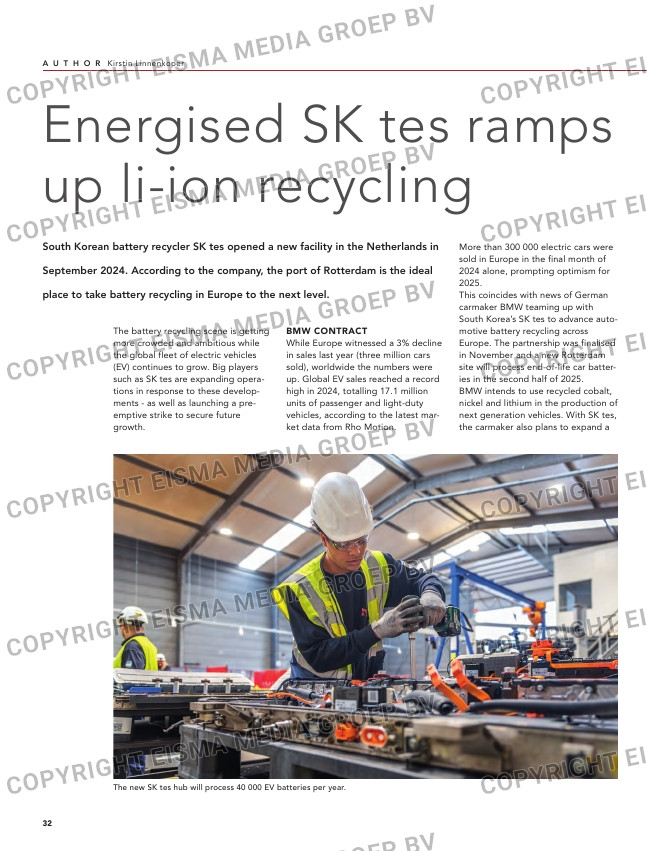32
Energised SK tes ramps
up li-ion recycling
South Korean battery recycler SK tes opened a new facility in the Netherlands in
September 2024. According to the company, the port of Rotterdam is the ideal
place to take battery recycling in Europe to the next level.
closed loop for EV batteries to the
US-Mexico-Canada region by 2026.
IMPORTANT HUB
The company’s new factory in
Rotterdam focuses on the ‘young but
rapidly emerging’ market of EVs. For
Thomas Holberg, chief operating offi-
cer of the new facility, it is a ‘circular
investment’ with battery recycling
seen as essential for keeping pace
with increasing electrification.
‘For many years we have worked
closely with car manufacturers and
battery producers to understand their
needs and ensure that we remain at
the forefront of recycling technology,’
said Holberg during the official fes-
tive opening. A tour of the new recy-
cling ‘hub’ was a highlight of the
event.
The site covers 10 000 square metres
and is equipped to process up to 10
000 tonnes of material annually –
which represents roughly 40 000 EV
batteries. Holberg adds plans are
underway to double the capacity by
The battery recycling scene is getting
more crowded and ambitious while
the global fleet of electric vehicles
(EV) continues to grow. Big players
such as SK tes are expanding opera-
tions in response to these develop-
ments – as well as launching a pre-
emptive strike to secure future
growth.
BMW CONTRACT
While Europe witnessed a 3% decline
in sales last year (three million cars
sold), worldwide the numbers were
up. Global EV sales reached a record
high in 2024, totalling 17.1 million
units of passenger and light-duty
vehicles, according to the latest mar-
ket data from Rho Motion.
More than 300 000 electric cars were
sold in Europe in the final month of
2024 alone, prompting optimism for
2025.
This coincides with news of German
carmaker BMW teaming up with
South Korea’s SK tes to advance auto-
motive battery recycling across
Europe. The partnership was finalised
in November and a new Rotterdam
site will process end-of-life car batter-
ies in the second half of 2025.
BMW intends to use recycled cobalt,
nickel and lithium in the production of
next generation vehicles. With SK tes,
the carmaker also plans to expand a
A U T H O R Kirstin Linnenkoper
The new SK tes hub will process 40 000 EV batteries per year. The recycler is mainly dealing with production waste at the moment.
32-33-34-35_sktes.indd 32 29-01-2025 11:26




